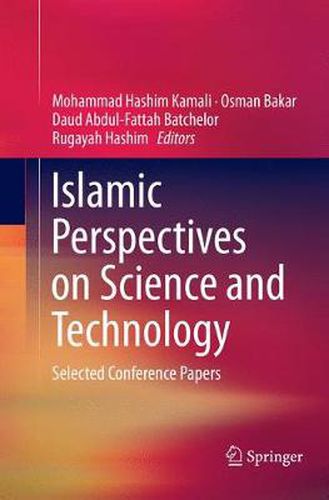Readings Newsletter
Become a Readings Member to make your shopping experience even easier.
Sign in or sign up for free!
You’re not far away from qualifying for FREE standard shipping within Australia
You’ve qualified for FREE standard shipping within Australia
The cart is loading…






This title is printed to order. This book may have been self-published. If so, we cannot guarantee the quality of the content. In the main most books will have gone through the editing process however some may not. We therefore suggest that you be aware of this before ordering this book. If in doubt check either the author or publisher’s details as we are unable to accept any returns unless they are faulty. Please contact us if you have any questions.
This book presents 25 selected papers from the International Conference on Developing Synergies between Islam & Science and Technology for Mankind’s Benefit held at the International Institute for Advanced Islamic Studies Malaysia, Kuala Lumpur, in October 2014. The papers cover a broad range of issues reflecting the main conference themes: Cosmology and the Universe, Philosophy of Science and the Emergence of Biological Systems, Principles and Applications of Tawhidic Science, Medical Applications of Tawhidic Science and Bioethics, and the History and Teaching of Science from an Islamic Perspective. Highlighting the relationships between the Islamic religious worldview and the physical sciences, the book challenges secularist paradigms on the study of Science and Technology. Integrating metaphysical perspectives of Science, topics include Islamic approaches to S&T such as an Islamic epistemology of the philosophy of science, a new quantum theory, environmental care, avoiding wasteful consumption using Islamic teachings, and emotional-blasting psychological therapy. Eminent contributing scholars include Osman Bakar, Mohammad Hashim Kamali, Mehdi Golshani, Mohd. Kamal Hassan, Adi Setia and Malik Badri. The book is essential reading for a broad group of academics and practitioners, from Islamic scholars and social scientists to (physical) scientists and engineers.
$9.00 standard shipping within Australia
FREE standard shipping within Australia for orders over $100.00
Express & International shipping calculated at checkout
This title is printed to order. This book may have been self-published. If so, we cannot guarantee the quality of the content. In the main most books will have gone through the editing process however some may not. We therefore suggest that you be aware of this before ordering this book. If in doubt check either the author or publisher’s details as we are unable to accept any returns unless they are faulty. Please contact us if you have any questions.
This book presents 25 selected papers from the International Conference on Developing Synergies between Islam & Science and Technology for Mankind’s Benefit held at the International Institute for Advanced Islamic Studies Malaysia, Kuala Lumpur, in October 2014. The papers cover a broad range of issues reflecting the main conference themes: Cosmology and the Universe, Philosophy of Science and the Emergence of Biological Systems, Principles and Applications of Tawhidic Science, Medical Applications of Tawhidic Science and Bioethics, and the History and Teaching of Science from an Islamic Perspective. Highlighting the relationships between the Islamic religious worldview and the physical sciences, the book challenges secularist paradigms on the study of Science and Technology. Integrating metaphysical perspectives of Science, topics include Islamic approaches to S&T such as an Islamic epistemology of the philosophy of science, a new quantum theory, environmental care, avoiding wasteful consumption using Islamic teachings, and emotional-blasting psychological therapy. Eminent contributing scholars include Osman Bakar, Mohammad Hashim Kamali, Mehdi Golshani, Mohd. Kamal Hassan, Adi Setia and Malik Badri. The book is essential reading for a broad group of academics and practitioners, from Islamic scholars and social scientists to (physical) scientists and engineers.